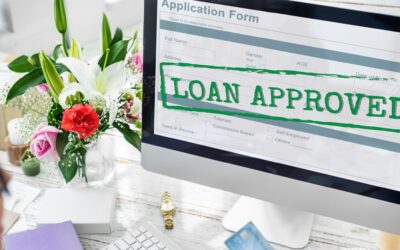Having bad credit can make qualifying for commercial real estate loans feel like a relentless uphill climb, but it’s not hopeless, and you are certainly not alone.
Many CRE borrowers are in the same position, especially these days as the commercial property market goes through a period of instability.
The key is to look beyond traditional banks and search for commercial lenders for bad credit who specialize in working with higher-risk CRE loan applicants.
From hard money loans for bad credit to bridge loans for bad credit, the funding you need is still within reach — it just takes a bit more strategy.
This guide will walk you through the types of commercial real estate financing
available for borrowers with bad credit. We also talk about how to improve your chances of approval and how to get a commercial real estate loan when traditional routes are closed.
How Bad Credit Affects Your Ability to Get Commercial Property Loans
First, let’s define what is typically considered “bad credit” in commercial real estate financing.
In CRE lending terms, a credit score below 600 is usually considered poor, and even scores between 600 and 650 may trigger additional scrutiny especially if the loan is for a higher-risk asset class like retail or hospitality, or if the property has limited cash flow history.
Your credit score is based on several factors — including how consistently you’ve paid past debts, how much debt you currently carry, how long you’ve had credit, the types of credit you use, and any recent credit inquiries.
This data together forms your FICO score, which ranges from 300 to 850.
Scores below 580 suggest a higher likelihood of loan delinquency — in fact, research from Experian shows that more than half of borrowers with scores in this range are at risk of becoming seriously delinquent.
This is why banks and other traditional commercial real estate loan providers see bad credit scores as an indicator of higher risk.
It tells them that you’ve missed payments in the past or currently have high debt relative to your credit limits — red flags that raise the possibility of default.
Aside from the score itself, lenders also look for patterns. If you’ve applied for new credit frequently — especially within a short period — it tells them that you might be overextended (taking on more debt than you can manage).
Does your credit history only show one type of account, like credit cards but no loans or lines of credit?
This lack of variety gives lenders less information about how you handle different financial responsibilities, making it harder for them to assess your reliability as a borrower.
The cost of poor credit in CRE financing
1. Lower LTV ratio
The first and most immediate hurdle you will face when applying for bad credit real estate loans is a lower allowable loan-to-value (LTV) ratio.
Borrowers with solid credit might qualify for up to 80% financing of a property’s value, but with bad credit, that number often drops to 60% to 65%.
That means you’ll need to provide a larger down payment — sometimes 35% or more — to secure the same property.
2. Higher interest rate
You’ll also likely be charged higher interest rates because lenders see you as a bigger risk. If you have bad credit, you might be quoted rates that are 2% to 4% higher than someone with strong credit.
That difference adds up quickly on a large commercial property loan — it can raise your monthly payments and cut into your net operating income, potentially making the investment less attractive or even unworkable.
3. Strict underwriting process
Finally, the underwriting process for bad credit commercial property finance is often more demanding.
Expect lenders to dive deep into your financial history — they’ll want to see a strong business plan, proof of income, and possibly collateral beyond the property itself.
You will likely need to submit more documentation requirements, and the process from application to funding can take much longer.
Top Commercial Property Loans Suitable for Borrowers with Bad Credit
It’s easy to feel like every door is closed when you’re trying to get bad credit real estate loans. But that’s not true — there are commercial lenders for bad credit if you know where to look.
Alternative lenders and creative deal structures allow you to finance a CRE asset even if your credit history isn’t perfect.
Below are the most common commercial property loans available to borrowers with bad credit in the US, each with its own trade-offs, benefits, and ideal use cases.
1. Hard money loans for bad credit
Hard money loans are based on the value of the property and NOT on your credit history. Private lenders fund these deals quickly because they’re more interested in the collateral than in your financial past.
Hard money lenders look at the LTV ratio and the potential income or resale value of the property when deciding how much they’re willing to lend. Because the loan is secured by the asset, your credit score carries much less weight.
Hard money loans are particularly suitable for short-term projects like fix-and-flips, time-sensitive acquisitions, or bridge financing.
Pros:
- Fast approval and funding
- Low emphasis on credit score
- Flexible terms with direct lender negotiation
Cons:
- High interest rates, often between 8% and 18%
- Steep origination fees (2% to 10%)
- Short repayment periods (6 to 36 months)
- LTVs often capped at 50% to 75%, requiring a substantial down payment
2. Bridge loans for bad credit
Bridge loans can give you fast capital while you wait for long-term financing. They are similar to hard money loans in terms of speed and credit leniency. Lenders in this space assess the strength of the deal rather than your credit alone.
They want to see a reliable exit plan — like refinancing with a permanent loan or selling another asset.
How do you qualify for bridge loans for bad credit? There are four key things to remember:
- Present a clear, realistic exit strategy.
- Show strong equity in the property.
- Offer a detailed business plan.
- Provide additional collateral, if possible.
Pros:
- Quick access to funds
- More flexible review process
- Useful for seizing short-term opportunities
Cons
- Higher interest than traditional loans
- Origination and closing fees
- Short repayment terms (typically 6 to 36 months)
3. Income based loans for bad credit (stated income loans)
If you find it hard to demonstrate how much you earn because your tax returns don’t reflect your actual cash flow, you might qualify for stated income loans.
CRE lenders who specialize in this niche look at the property’s performance rather than your tax returns or W-2s.
Instead of verifying your income, the lender looks at the property’s net operating income (NOI) and uses the debt service coverage ratio (DSCR) to assess risk.
The ideal DSCR is 1.25 or higher — meaning the property earns at least 25% more than the loan payment.
Income based loans for bad credit suit:
- Self-employed borrowers
- Small business owners
- Those with consistent rental income but irregular personal earnings
Pros
- No need for traditional income verification
- Focus on the property’s financials
- Available to borrowers with inconsistent or hard-to-document income
Cons
- Higher rates than conventional loans
- Heavier emphasis on property cash flow
- Still requires solid equity and financial planning
4. SBA 504 loans
Backed by the federal government, SBA 504 loans are designed to help small businesses purchase commercial property.
The SBA prefers strong credit but may approve loans for borrowers with lower scores if other areas of the application are strong.
The loan is split three ways: 50% from a lender, 40% from a CDC, and 10% from you. The SBA guarantee lowers the lender’s risk.
To increase your chances of approval, be sure to:
- Offer substantial collateral beyond the property.
- Show stable business cash flow and financial records.
- Submit a clear, well-documented business plan.
- Explain past credit issues and how you’ve addressed them.
Pros
- Low down payments and long terms (up to 25 years)
- Competitive fixed interest rates
Cons
- Lengthy application and approval process
- Requires a strong narrative to overcome poor credit
- Not ideal for quick closings or time-sensitive purchases
5. Seller financing
Sometimes the seller of the property is willing to help finance the deal. In seller financing, you can avoid banks altogether because you make monthly payments directly to the seller.
It works with bad credit as sellers are often more interested in a steady income stream and a quick sale than your credit history.
If you can show reliable income and make a compelling case, they may be open to financing.
Tips for success:
- Find motivated sellers who’ve had properties on the market a while.
- Explain the benefits for them: passive income, reduced taxes, quicker sale.
- Offer a realistic down payment to build trust.
6. Lease-to-own deals
If you intend to use the premises to run your business, you may be able to rent the property with the option to buy it later. Part of your monthly payment may count toward the purchase price, giving you time to improve your credit and secure financing.
Lease-to-own deals are best for:
- Buyers rebuilding credit
- Those who need time to gather a larger down payment
- Investors who want to test a property before committing
As you can see, bad credit doesn’t have to stop you from investing in commercial real estate. The key is preparation.
When you understand what lenders want, you give yourself a real chance to succeed despite past credit setbacks. We cover some tried-and-tested tips in the next section.
How to Improve Your Chances of Getting a Loan with Bad Credit
- Offer more collateral or a larger down payment.
What’s the simplest way to calm a lender’s concerns? Reduce their risk. When you offer a higher down payment — say, 30% or more — you’re showing that you have skin in the game, which gives lenders an added layer of security. Doing this tells lenders that you’re serious and financially committed to the investment even if your credit history is less than ideal.
- Present a detailed and realistic business plan.
Include detailed income and expense projections, tenant plans (if applicable), timelines for renovations or lease-ups, and a clear exit strategy if the project involves resale. Show lenders how the property will generate revenue and how you’ll use that income to repay the loan. That level of planning speaks louder than a credit score.
- Bring in a strong co-signer or partner.
Are you working with someone who has solid credit and a stable financial background? Consider including them in the loan application. Having a co-signer or business partner with a stronger credit profile can help balance your risk as a borrower and gives lenders added reassurance that someone else with financial stability is backing the deal.
- Review and clean up your credit report.
Get your credit reports from all three major bureaus — Equifax, Experian, and TransUnion — before applying for a loan. Mistakes (which are unfortunately quite common) and can bring your score down. Be sure to dispute any errors you find — such as accounts that don’t belong to you, incorrect payment histories, or outdated information.
- Highlight your business’s track record.
Has your company been running for a while? Show that history — demonstrate that you have a stable cash flow and steady profits. Include client contracts to support your case.
Even if your personal credit is poor, lenders will take a second look if your business shows financial stability.
Where to Find Commercial Property Loans for Bad Credit
The best commercial real estate lenders for bad credit understand the realities behind your credit history and are open to evaluating the full picture.
- Private commercial real estate lenders and hard money specialists
Private commercial real estate lenders base decisions on the value and potential of the property — not your FICO score. These lenders are usually investor groups or companies that specialize in hard money loans. They work fast and have flexible requirements for commercial real estate loans. Because they are often CRE investors themselves, they accept deals that banks stay away from. Expect higher interest rates and fees but also faster closings and fewer obstacles tied to your credit history.
Private Capital Investors is one of the most trusted private commercial real estate lenders offering hard money loans for bad credit and bridge loans for bad credit. We also offer stated income loans.
- Local community banks and credit unions
Don’t overlook smaller financial institutions such as local banks and credit unions. They tend to know their markets well and may be more willing to listen to your full story, especially if you already bank with them or can show strong business cash flow.
- Commercial mortgage brokers who understand complex cases
Some brokers specialize in helping borrowers with credit challenges in particular. They can access networks of lenders who are open to alternative financing arrangements and understand that not all applicants fit into a traditional mold. They’ll also help you highlight your strengths to improve your odds of getting a deal done.
- Online lending marketplaces
Web platforms like Lendio and Fundera make it easier to shop around for commercial loans without going lender to lender. These marketplaces collect your information through a single application and then match you with multiple lenders — including those who work with non-traditional borrowers — so you can compare multiple offers quickly. Just be aware of the fine print.
- Commercial real estate investment groups and networking
Sometimes, the best opportunities come from relationships and NOT institutions. Commercial real estate investment groups are full of people who’ve been through the same challenges. Many members have access to private capital or know investors who are willing to fund good deals. Share your plans and be upfront about your challenges — you might just connect with someone interested in directly backing your project.
Conclusion
Do not let a bad credit score lock you out of commercial real estate completely. Yes, the process might take more planning, and you’ll likely face tighter requirements — but with the right strategy and a lot of persistence, financing is absolutely within reach.
Focus on what you can control: present a clear business plan that shows how the property will generate income, and prepare clean, well-organized financial records to back up your projections.
Don’t try to hide your bad credit score. Be open with lenders about your credit history, but highlight how you’ve moved forward.
Say exactly what caused the credit issues — such as a past business closure or medical debt — and what steps you’ve taken since, like paying off delinquent accounts or building consistent payment history.
Most importantly, shop around and build relationships with alternative lenders.
Don’t hesitate to explore non-traditional financing routes. The more informed and prepared you are, the more likely you are to find a lender who’s ready to work with you.
Looking for flexible commercial property financing?
Private Capital Investors specializes in helping borrowers of all credit profiles secure the right commercial property loan. Contact our team of private commercial real estate lenders today to explore your options and move one step closer to your next investment.







